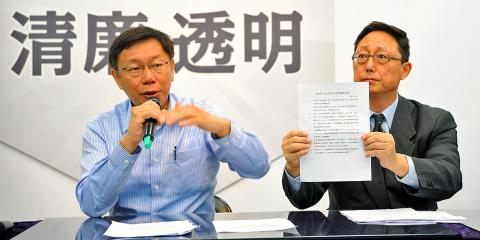Independent Taipei mayoral candidate Ko Wen-je (柯文哲) yesterday denied allegations that a US writer’s book claims that he purchased human organs from China for transplants.
Ethan Gutmann’s The Slaughter: Mass Killings, Organ Harvesting, and China’s Secret Solution to Its Dissident Problem, which was published in August, reportedly alleges that Ko, as director of National Taiwan University Hospital’s (NTUH) Department of Traumatology, bought organs from China prior to an interview Gutmann conducted with Ko in August 2007.
Gutmann reportedly wrote that Ko had considered purchasing organs from China due to the long wait — about two or three years — for people awaiting liver and kidney transplants in Taiwan, but that the doctor was worried that organs from Chinese death row inmates would be of poor quality due to disease or narcotics use.

Photo: Liu Hsin-de, Taipei Times
Gutmann reportedly claims that Ko reached an agreement with Chinese doctors to receive the organs of Falun Gong members, as most of them were young and healthier.
Ko’s campaign office issued a statement on Monday night denying the allegations.
The statement said that Ko agreed to be interviewed by Gutmann in 2007 to talk about the shady sources of Chinese human organs.
The office said that Ko has recordings of the interview that would prove the discrepancies between what Ko said and what Gutmann wrote.
Ko yesterday said that after overseeing post-transplant care at the hospital, he had not conducted transplants nor bought or sold human organs in China.
Gutmann contacted him because he was one of the designers of Taiwan’s organ transplant registry system, Ko said.
Ko said he told Gutmann that there were some doctors in Taiwan who had been involved in buying or selling organs for transplant, but that he was not one of them.
He never drank with Chinese officials or went to karaoke parlors with them as the book reportedly claims, the doctor said.
Taiwan lacked a systematic management plan for organ donations, which was why he spent two years helping establish a registry system and made it as transparent as possible, Ko said, adding that the system did not deter people from going to China for organ transplants.
Meanwhile, physician Huang Shi-wei (黃士維), who is deputy director of the Taiwan Association for International Care of Organ Transplants, and who helped set up the interview between Gutmann and Ko, was quoted by news Web site Newtalk as saying that he got in touch with Gutmann after local media reported on the book.
Gutmann, through an interpreter, told him that he had not said that Ko was involved in the organ trade and that he might have been misinterpreted, Huang said.
Huang also quoted Gutmann as saying that he has received notice from Ko’s lawyer about the alleged inaccuracies and that he would, through his lawyer, discuss with Ko how to correct the book.
Chinese Nationalist Party (KMT) Taipei mayoral candidate Sean Lien (連勝文) yesterday said that if the allegations were true, “it sounds like a very scary matter.”
Ko must address the allegations in full detail or risk his integrity being stained, Lien said.

Alain Robert, known as the "French Spider-Man," praised Alex Honnold as exceptionally well-prepared after the US climber completed a free solo ascent of Taipei 101 yesterday. Robert said Honnold's ascent of the 508m-tall skyscraper in just more than one-and-a-half hours without using safety ropes or equipment was a remarkable achievement. "This is my life," he said in an interview conducted in French, adding that he liked the feeling of being "on the edge of danger." The 63-year-old Frenchman climbed Taipei 101 using ropes in December 2004, taking about four hours to reach the top. On a one-to-10 scale of difficulty, Robert said Taipei 101

Taiwanese and US defense groups are collaborating to introduce deployable, semi-autonomous manufacturing systems for drones and components in a boost to the nation’s supply chain resilience. Taiwan’s G-Tech Optroelectronics Corp subsidiary GTOC and the US’ Aerkomm Inc on Friday announced an agreement with fellow US-based Firestorm Lab to adopt the latter’s xCell, a technology featuring 3D printers fitted in 6.1m container units. The systems enable aerial platforms and parts to be produced in high volumes from dispersed nodes capable of rapid redeployment, to minimize the risk of enemy strikes and to meet field requirements, they said. Firestorm chief technology officer Ian Muceus said

MORE FALL: An investigation into one of Xi’s key cronies, part of a broader ‘anti-corruption’ drive, indicates that he might have a deep distrust in the military, an expert said China’s latest military purge underscores systemic risks in its shift from collective leadership to sole rule under Chinese President Xi Jinping (習近平), and could disrupt its chain of command and military capabilities, a national security official said yesterday. If decisionmaking within the Chinese Communist Party has become “irrational” under one-man rule, the Taiwan Strait and the regional situation must be approached with extreme caution, given unforeseen risks, they added. The anonymous official made the remarks as China’s Central Military Commission Vice Chairman Zhang Youxia (張又俠) and Joint Staff Department Chief of Staff Liu Zhenli (劉振立) were reportedly being investigated for suspected “serious

American climber Alex Honnold is to attempt a free climb of Taipei 101 today at 9am, with traffic closures around the skyscraper. To accommodate the climb attempt and filming, the Taipei Department of Transportation said traffic controls would be enforced around the Taipei 101 area. If weather conditions delay the climb, the restrictions would be pushed back to tomorrow. Traffic controls would be in place today from 7am to 11am around the Taipei 101 area, the department said. Songzhi Road would be fully closed in both directions between Songlian Road and Xinyi Road Sec 5, it said, adding that bidirectional traffic controls would